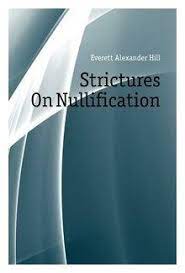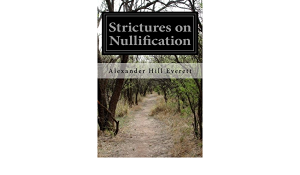Finally available, a high quality book of the original classic edition of Strictures on Nullification. It was previously published by other bona fide publishers, and is now, after many years, back in print. This is a new and freshly published edition of this culturally important work by Alexander Hill Everett, which is now, at last, again available to you. Get the PDF and EPUB NOW as well. Included in your purchase you have Strictures on Nullification in EPUB AND PDF format to read on any tablet, eReader, desktop, laptop or smartphone simultaneous – Get it NOW. Enjoy this classic work today. These selected paragraphs distill the contents and give you a quick look inside Strictures on Nullification:Look inside the book: If it could be made out that the two Houses of Congress, the President, and the various executive and judicialPg 25 officers acting under them, are not a proper Government, but a mere agency constituted by four and twenty mutually independent States for certain specific objects, it would follow, not precisely that the theory of nullification is true, for this, as we have seen, is, at least as stated by the Vice-President in the document before us, not merely unconstitutional, but in itself essentially impracticable, incongruous and absurd:-but that any State which might be, for any or no reason, tired of the arrangement, would have a perfect right, after such consultation and advisement with the other parties as might be necessary to secure their interests, to revoke its powers.
 …When therefore the Vice-President fully and formally admits that the two Houses of Congress, the President, and the executive and judicial officers acting under them are a real Government;-that the instrument by virtue of which they hold their powers is a real Constitution or social compact, he admits,-if he choose at the same time to describe them as an agency,-that they are an agency which the parties that constituted it, whether States or individuals, have not a right to revoke at discretion; an agency which construes its own powers, and has a right to enforce its own construction of them upon its principals, excepting in the extreme cases which justify a violent resistance to the law: he admits that nullification is either wholly unjustifiable or justifiable only as resistance: he admits, in a word, that nullification, if it have any proper and intelligible meaning at all, is only another name for rebellion.
…When therefore the Vice-President fully and formally admits that the two Houses of Congress, the President, and the executive and judicial officers acting under them are a real Government;-that the instrument by virtue of which they hold their powers is a real Constitution or social compact, he admits,-if he choose at the same time to describe them as an agency,-that they are an agency which the parties that constituted it, whether States or individuals, have not a right to revoke at discretion; an agency which construes its own powers, and has a right to enforce its own construction of them upon its principals, excepting in the extreme cases which justify a violent resistance to the law: he admits that nullification is either wholly unjustifiable or justifiable only as resistance: he admits, in a word, that nullification, if it have any proper and intelligible meaning at all, is only another name for rebellion.
 …It was by forming themselves into one body politic, and by expressly stipulating with each other in the compact by which this body politic was formed, that the acts of the General Government representing it should be paramount to their own, that the States surrendered the right of putting their own construction on the powers of the General Government; and this is the foundation of the authority possessed by the judges, when, by virtue of a different clause, they take cognisance of cases arising under the Constitution, to decide, as they undoubtedly must and would do, that any act of a State, whether in its sovereign or legislative capacity, pretending to annul an act of the General Government, is of itself, ipso facto, null and void.
…It was by forming themselves into one body politic, and by expressly stipulating with each other in the compact by which this body politic was formed, that the acts of the General Government representing it should be paramount to their own, that the States surrendered the right of putting their own construction on the powers of the General Government; and this is the foundation of the authority possessed by the judges, when, by virtue of a different clause, they take cognisance of cases arising under the Constitution, to decide, as they undoubtedly must and would do, that any act of a State, whether in its sovereign or legislative capacity, pretending to annul an act of the General Government, is of itself, ipso facto, null and void.
